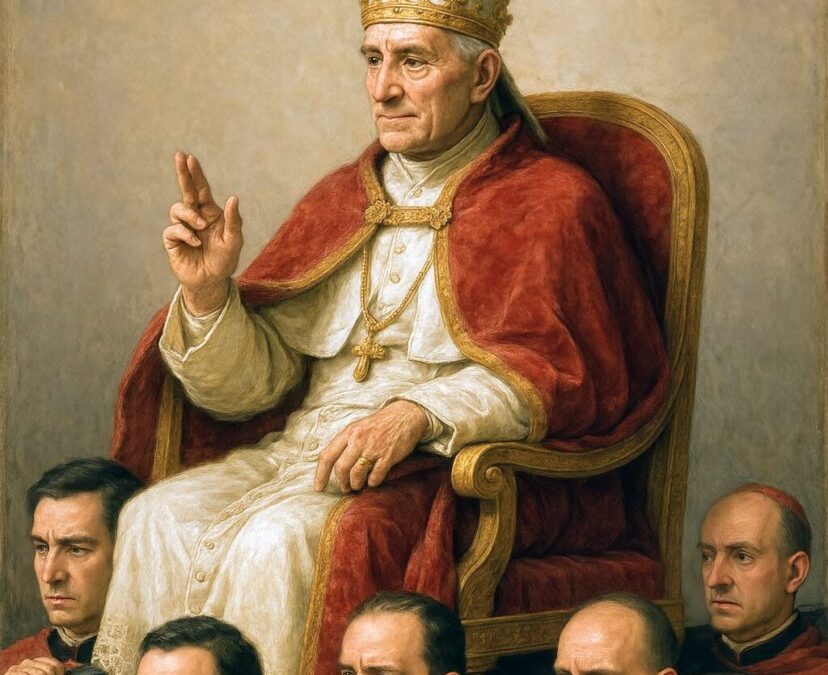For many centuries, the Roman Church has claimed, and defended with violence, its own civil and moral authority, even its infallibility. This authority has been used to destroy millions of lives of those who resisted the Church’s blasphemous assertions.
Pope Boniface VIII (1235-1303), in a dispute with monarchs of his day, issued a famous bull called Unam Sanctam (One Holy Church). In it, he asserted the power of the papacy over all civil and religious authorities. According to Boniface, salvation for the entire world is under the control of Rome.
This amazing claim certainly remains the teaching of Catholicism today. Boniface not only spoke for the Church of his time forward, but implicitly to the Church of the past, from the first “Pope” Peter in the 1st Century to Pope Leo XIV in the 21st Century. It is common for people to say that the Roman Church has existed for 2,000 years.
For the last two centuries, Rome has steadily worked to heal the wound it suffered in 1798, if only in public perception. Franklin Roosevelt praised the papacy for its moral strength during the Second World War. During the late 1980s, the Berlin Wall fell and countries under the thumb of the Soviet Union entered a new era of freedom. Mikhail Gorbachev, the Soviet leader at the time, proclaimed Pope John Paul II “the highest moral authority on Earth.”
John Paul worked closely with President Ronald Reagan in an effort to end communist rule in Eastern Europe. Reagan lauded the pontiff for his defense of freedom and his moral authority that enabled the two leaders to “bring down that wall!”
Other world leaders have expressed similar praise for the occupants of the papal throne. Ban Ki-moon, UN Secretary-General, called Pope Francis a “moral voice of the world.” German Chancellor Angela Merkel said Pope Benedict XVI was a “moral authority of our time.”
Recently elected Pope Leo XIV is acting quickly to add his voice to that of his predecessors. He is speaking out for peace in the Middle East, promoting synodality (inclusive church governance), and attacking clerical abuse. His persona so far is that of a gentle pastor and humble priest who cares for the oppressed and the poor, especially for immigrants to the United States who at this time are being forcefully expelled from the country.
The installment ceremony for Pope Leo XIV dominated world media in a way never seen. Rome now commands a greater world “presence” than ever before simply on the basis of the latest communication technology. Millions watched the spectacular rituals and pomp of Catholicism in all its glory.
When Leo, or any pope, speaks, he is above the fray of politics and sectarian division. His coronation saw representatives of a great multitude of world religions and governments. Present were representatives of closely related faiths such as the Orthodox, but also Protestant Anglicans, Lutherans, and Methodists. Latter-day Saints were present as were Jewish, Muslim, Hindu, Buddhist, Sikh, Zoroastrian, and Jainist leaders.
No pope has ever attended any coronation other than his own, with two exceptions: Leo III crowned Charlemagne in 800 A.D., and Pius VII attended the coronation of Napoleon (1804). Napoleon crowned himself on that occasion, to show his superiority to the Church.
The papacy sees itself as superior to any other church or secular leader. And apparently, the world does too.
The Bible predicted all this. Daniel 7 foretells the development of Rome as a blasphemous, persecuting, pompous power enduring to the end of time. Rev. 13 foretells a sea beast that would be a powerful persecuting power for 1260 years, would receive a deadly wound, and rebound for a last period of world domination.
Papal Rome and the sea beast are the same power. We are alive to see the world once again acknowledge the authority of Rome. How long until this power begins a final, great persecution that ends in a death decree in the style of Nebuchadnezzar, king of Babylon?
Every precious Catholic with an honest heart must heed the call to “Come out of her, my people” (Rev. 18:4). Scripture foretells the destruction of Rome, and now is the time to flee her communion.

